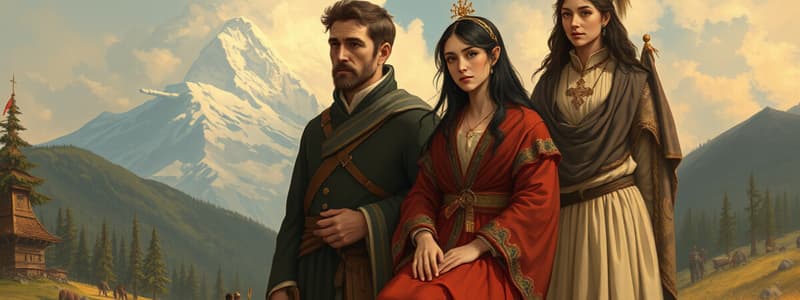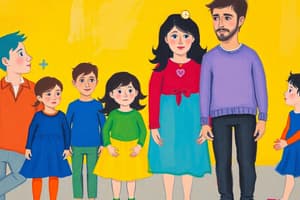Podcast
Questions and Answers
What has been a consistent aspect of families throughout Canadian history?
What has been a consistent aspect of families throughout Canadian history?
- Families have always been of a single, fixed structure.
- Families have primarily existed in isolation from societal changes.
- Families have commonly rejected dominant social norms.
- Families have been central to social formation and identities. (correct)
How have families acted in the context of historical change?
How have families acted in the context of historical change?
- They have remained unaffected by cultural shifts.
- They have actively participated as historical actors. (correct)
- They have always been passive recipients of changes.
- They have generally resisted societal influences.
What was the percentage of lone-parent families in 1966?
What was the percentage of lone-parent families in 1966?
- 8.2% (correct)
- 12%
- 10%
- 14%
Which event contributed to the change in family structure during the 1950s?
Which event contributed to the change in family structure during the 1950s?
What does the concept of 'cult of domesticity' refer to?
What does the concept of 'cult of domesticity' refer to?
What significant legal change occurred in 2005 regarding family forms?
What significant legal change occurred in 2005 regarding family forms?
Which factor has NOT significantly influenced the history of Canadian families?
Which factor has NOT significantly influenced the history of Canadian families?
What reformist movement involved women advocating for the needs of poor families?
What reformist movement involved women advocating for the needs of poor families?
What trend regarding working mothers was noted in families at the millennium?
What trend regarding working mothers was noted in families at the millennium?
What was the impact of chain migration in early 20th-century Canada?
What was the impact of chain migration in early 20th-century Canada?
In the context of family classification, how were women and children viewed historically?
In the context of family classification, how were women and children viewed historically?
What trend regarding marriage was observed as families approached the millennium?
What trend regarding marriage was observed as families approached the millennium?
What characterized the changes in family structure due to modernization?
What characterized the changes in family structure due to modernization?
Which group of families historically exhibited variations based on cultural backgrounds?
Which group of families historically exhibited variations based on cultural backgrounds?
In the context of family dynamics, what does the term 'childless by choice' refer to?
In the context of family dynamics, what does the term 'childless by choice' refer to?
What demographic change contributed to smaller family sizes observed in the late 20th century?
What demographic change contributed to smaller family sizes observed in the late 20th century?
What were some traditional family functions transitioned to during societal changes?
What were some traditional family functions transitioned to during societal changes?
What negative consequence affected families in the past due to high infant and maternal mortality rates?
What negative consequence affected families in the past due to high infant and maternal mortality rates?
What was a significant impact of the Indian Act on Indigenous families?
What was a significant impact of the Indian Act on Indigenous families?
Which demographic trend contributed to changes in the structure of Canadian families?
Which demographic trend contributed to changes in the structure of Canadian families?
What was a common reason for the existence of single-parent or blended families during the early 20th century?
What was a common reason for the existence of single-parent or blended families during the early 20th century?
Which organization was established in 1920 to focus on child and family welfare in Canada?
Which organization was established in 1920 to focus on child and family welfare in Canada?
What demographic trend occurred between 1921 and 1931 in Canada?
What demographic trend occurred between 1921 and 1931 in Canada?
What was one effect of the Great Depression on Canadian families?
What was one effect of the Great Depression on Canadian families?
Which societal observation was prevalent during the reconstruction period after World War II?
Which societal observation was prevalent during the reconstruction period after World War II?
What was one reason for the rise in birth rates after World War II?
What was one reason for the rise in birth rates after World War II?
What societal role did organizations like the Women’s Christian Temperance Union serve in the late 19th century?
What societal role did organizations like the Women’s Christian Temperance Union serve in the late 19th century?
Which demographic factor is associated with changes in the life course of Canadian families?
Which demographic factor is associated with changes in the life course of Canadian families?
Flashcards are hidden until you start studying
Study Notes
Learning Objectives
- Analyze major historical changes and continuities in Canadian family structures over the last 200 years.
- Discuss the patriarchal family system and its role in maintaining hierarchies based on class, race, gender, and age.
- Reflect on how societal anxieties shape the concept of "family" at different historical moments.
- Recognize the varied forms of families throughout history, challenging the notion of a single ideal family model.
Historical Context
- Families have always been central to social, political, and economic systems and identity in Canada.
- Various family models have existed historically, including those of First Nations, Métis, Inuit, and immigrant families.
Families as Historical Actors
- Families actively shape history rather than simply respond to changing societal norms.
- The mid-19th century saw work and family life separate, leading to the ideologies of "cult of domesticity" and "separate spheres."
Impact of Modernization
- Chain migration in the early 20th century led to new family formations, primarily from European immigrants.
- Traditional family roles increasingly transitioned to institutions (e.g., churches, state welfare) due to modernization.
Gender and Social Reform
- 'Maternal feminist' movements in the early 20th century advocated for government support for impoverished families.
- Women remained categorized as dependents despite their essential contributions to family and society.
Racial and Indigenous Family Dynamics
- Exclusionary immigration policies marginalized families from non-Western countries; Indigenous families faced detrimental government policies.
- The Indian Act enforced patrilineal structures, undermining Indigenous women's status and familial identity.
Demographic Shifts
- The transition to industrial capitalism correlated with demographic changes such as smaller family sizes and alterations in children's roles.
- The 1921 Census showed a record number of married Canadians, with a subsequent decline in birth rates by 14% from 1921 to 1931.
Mid-Century Developments
- Post-World War II era focused on the family, marked by increased divorce rates and the Baby Boom phenomenon.
- The ‘normal’ family ideal persisted, but societal changes began to challenge traditional structures.
Evolving Family Structures
- The late 20th century witnessed a decline in fertility rates, rise of childless couples, and greater participation of married mothers in the workforce.
- Legalization of same-sex marriage in 2005 and increasing common-law partnerships indicated evolving societal norms.
Conclusion
- The evolution of Canadian families over 200 years highlights the interplay between structural changes and familial narratives, influenced by industrialization, technology, changes in women’s status, government policies, and societal recognition of diverse family forms.
- The diverse experiences of family life reflect a complex tapestry of Canadian social history.
Studying That Suits You
Use AI to generate personalized quizzes and flashcards to suit your learning preferences.




